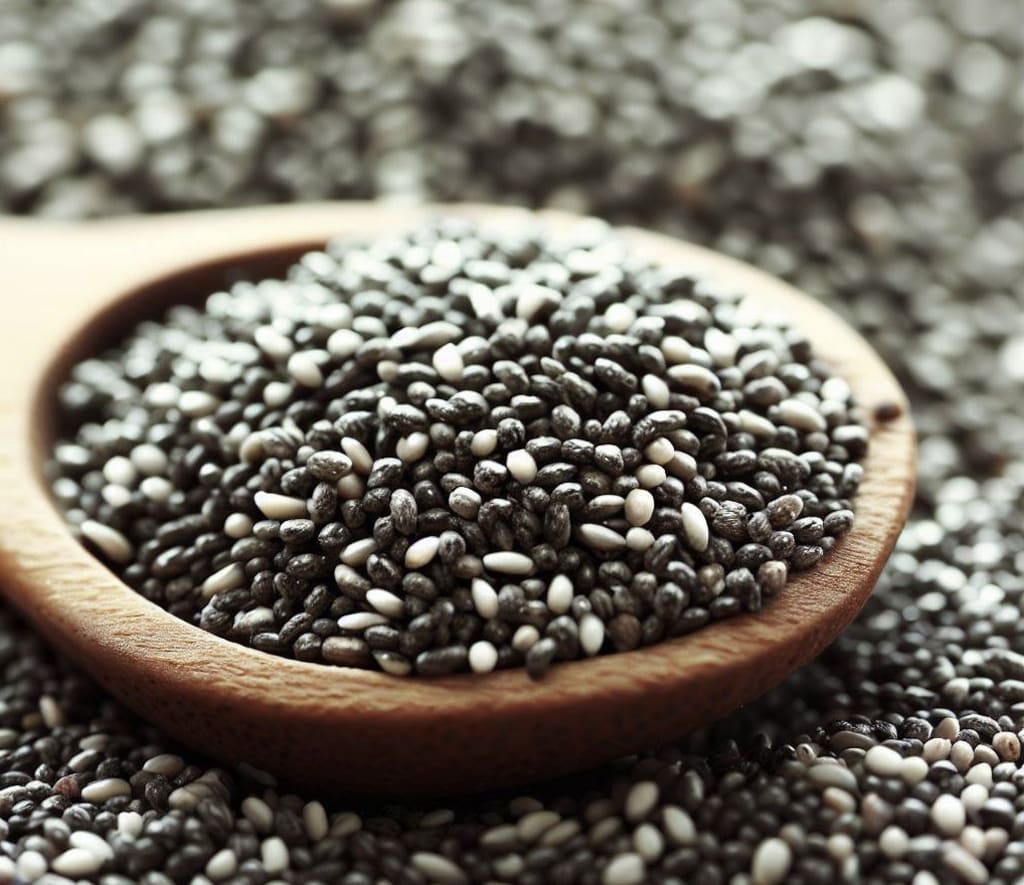Chia Seeds: A Natural Aid for Weight Management and Satiety
Say Goodbye to Digestive Issues with the Miraculous Chia Seeds

Chia seeds have gained significant popularity in recent years due to their numerous health benefits and nutritional value. These tiny seeds, derived from the Salvia hispanica plant, have a long history of use as a dietary staple in Central and South America. In this essay, we will explore the health effects of chia seeds, including their nutritional composition, potential benefits, and precautions to consider.
To begin, let's examine the nutritional profile of chia seeds. Despite their small size, chia seeds are packed with essential nutrients. They are an excellent source of dietary fiber, providing a high amount of soluble and insoluble fiber per serving. This fiber content helps promote digestive health, regulate blood sugar levels, and maintain a healthy weight.
Chia seeds are also rich in omega-3 fatty acids, particularly alpha-linolenic acid (ALA). Omega-3 fatty acids are essential fats that play a crucial role in brain function, heart health, and reducing inflammation in the body. Consuming foods high in omega-3 fatty acids, like chia seeds, can contribute to overall cardiovascular health and may reduce the risk of certain chronic diseases.
Furthermore, chia seeds are a good source of plant-based protein, making them an excellent option for individuals following a vegetarian or vegan diet. Protein is essential for various bodily functions, including building and repairing tissues, supporting immune function, and promoting satiety.
Chia seeds are also rich in minerals such as calcium, magnesium, and phosphorus, which are important for bone health, muscle function, and overall metabolic processes in the body. Additionally, they contain a variety of vitamins, including vitamin C, vitamin E, and several B vitamins.
The health benefits associated with chia seeds are diverse and impactful. One of the key advantages is their potential to support weight management. Due to their high fiber content, chia seeds can help increase feelings of fullness and promote satiety, which may assist in portion control and reducing calorie intake. Moreover, the gel-like consistency that chia seeds develop when soaked in water can further enhance feelings of fullness and slow down digestion.
Chia seeds also contribute to stabilizing blood sugar levels. The combination of soluble and insoluble fiber in chia seeds helps slow down the digestion and absorption of carbohydrates, preventing rapid spikes in blood sugar. This is particularly beneficial for individuals with diabetes or those at risk of developing the condition.
In addition, the omega-3 fatty acids found in chia seeds offer various health benefits. They have anti-inflammatory properties that can help reduce inflammation in the body, potentially benefiting individuals with chronic conditions such as arthritis. Omega-3 fatty acids also support brain health, cognitive function, and may have a positive impact on mood and mental well-being.
The high fiber content in chia seeds contributes to improved digestive health. Fiber aids in promoting regular bowel movements, preventing constipation, and supporting a healthy gut microbiome. A healthy gut microbiome has been associated with various aspects of overall health, including immune function, mental health, and even weight management.
It is important to note that while chia seeds offer numerous health benefits, they should be consumed in moderation and as part of a balanced diet. Due to their high fiber content, consuming excessive amounts of chia seeds without adequate fluid intake can lead to digestive discomfort or potentially worsen certain digestive conditions. It is advisable to start with smaller quantities and gradually increase consumption while monitoring individual tolerance.
In conclusion, chia seeds are a nutrient-dense superfood that can contribute to a healthy diet and offer a range of health benefits. They are rich in fiber, omega-3 fatty acids, protein, and various vitamins and minerals. The consumption of chia seeds has been linked to improved digestive health, weight management, blood sugar control, and cardiovascular health. However, it is essential to consume chia seeds in moderation and incorporate them into a balanced diet to reap their benefits effectively. As with any dietary changes, it is advisable to consult with a healthcare professional or registered dietitian to determine the appropriate amount and ensure it aligns with individual needs and health conditions.






Comments
There are no comments for this story
Be the first to respond and start the conversation.